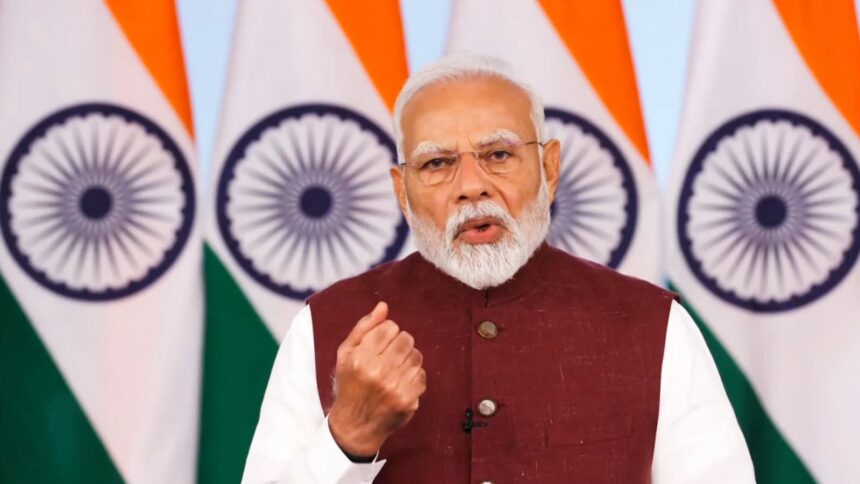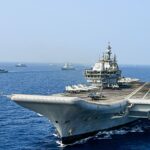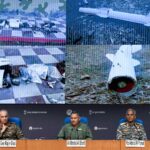WITH Uri and Balakot, Prime Minister Narendra Modi had pushed at the frontiers of deterrence. After Operation Sindoor, the most intense military campaign since Kargil, he delineated India’s new doctrine against terrorism resting on three key elements: a response on India’s terms; no tolerance for terror that hides under “”; and no distinction between the terrorists, their leaders and a government that sponsors them.
He also kept the strategic and military doors wide open making it clear has only “suspended” its military action and will watch Pakistan’s behaviour. “In the coming days we will measure every step of Pakistan on the criterion that what sort of attitude Pakistan will adopt ahead.”
Underlining that this is a “new normal”, this new policy is outlined to define Delhi’s approach that is qualitatively higher in aggression and also lowers the threshold for any future attacks.
“After the surgical strike and air strike, now Operation Sindoor is India’s policy against terrorism. Operation Sindoor has carved out a new benchmark in our fight against terrorism and has set up a new parameter and new normal.”
While India had given a “fitting reply” twice before — the surgical strike after Uri terror attack in September 2016 and the strike after the Pulwama terror attack in February 2019 — this is the first time, the Prime Minister has framed a response like the May 7 strikes on nine locations in response to April 22 Pahalgam terror attack.
This is also the first time Modi has called out Pakistan’s nuclear posturing evident in the way a meeting of the nuclear command authority was called and then cancelled. “India will not tolerate any nuclear blackmail. India will strike precisely and decisively at the terrorist hideouts developing under the cover of nuclear blackmail,” he said.
“We will not differentiate between the government sponsoring terrorism and the masterminds of terrorism. During Operation Sindoor the world has again seen the ugly face of Pakistan, when top Pakistani army officers came to bid farewell to the slain terrorists. This is strong evidence of state-sponsored terrorism. We will continue to take decisive steps to protect India and our citizens from any threat,” he said, targeting the Pakistan’s establishment that has long used cross-border terrorism against India as an instrument of policy. This means that Pakistan military and government are not off-limits for any future retributive actions as well.
For Modi to name the terrorist headquarters of Jaish-e-Muhammed and Lashkar-e-Taiba, is also something new, and he linked all of them to major terror attacks in the US and UK. This framed India’s war on terrorism as the latest in the global campaign that started with the one Americans and NATO forces had launched in Afghanistan after 9/11.
He flagged India’s capability and superiority in its offensive. “The world saw how Pakistan’s drones and missiles fell like straws…India’s strong air defence system destroyed them in the sky itself. Pakistan had prepared for an attack on the border, but India struck at the heart of Pakistan. India’s drones and missiles attacked with precision. They damaged those airbases of the Pakistani Air Forces, of which Pakistan was very proud.”
On the issue of who dialled the US with an SOS, he spelt out India’s objectives that were accomplished and India’s reason to pause military action for the moment. This is, in response to criticism, from some quarters from within his supporters on choosing to “prematurely” end the hostilities.
“…After India’s aggressive action, Pakistan started looking for ways to escape. Pakistan was pleading to the world to ease tensions. And after suffering heavy losses, Pakistan’s army contacted our DGMO on the afternoon of May 10. By then, we had destroyed the infrastructure of terrorism on a large scale. The terrorists were eliminated. We had destroyed the terror camps established in the heart of Pakistan. Therefore, when Pakistan appealed and said that it will not indulge in any sort of terror activities or military audacity further, India considered it.”
He also sought to bring the international community on the same page on countering terrorism by invoking his famous line on “this is not the era of war” to Russian President . This was to blunt the criticism of war-mongering by India.
“Our greatest strength is our unity against all forms of terrorism. This is certainly not the era of war but this is also not the era of terrorism. Zero tolerance against terrorism is the guarantee for a better world,” he said.
In a clear message to the global community including references made by US President and Secretary of State Marco Rubio on India-Pakistan talks, Modi reinforces the redlines on dialogue with Pakistan that has been suspended since 2016.
“The way the Pakistani army, Pakistan government are encouraging terrorism, it will destroy Pakistan one day. If Pakistan wants to survive, it will have to destroy its terror infrastructure. There is no other way to peace. India’s stand is very clear: Terror and talks cannot go together. Terror and trade cannot go together. Water and blood cannot flow together. Today, I would also like to tell the global community that our stated policy has been: if there are talks with Pakistan, it will be only on terrorism; and if there are talks with Pakistan, it will be only on Pakistan-occupied Kashmir (PoK).”








